Sustainability In Coworking Spaces: What Are We Talking About in 2024? The Case Study of Transforma Bxl.
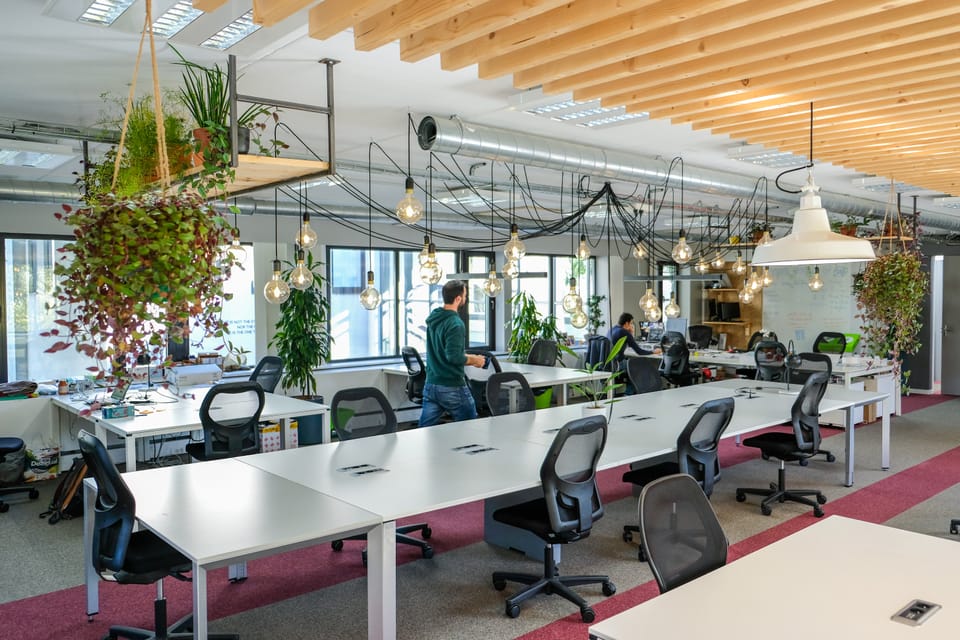
This article belongs to our mini-series that explores sustainability within the coworking sector, aiming to gain deeper insights into the initiatives being undertaken by coworking brands to enhance the sustainability of their spaces, benefit their members, and contribute positively to the planet.
Sustainability presents itself as a complex, multi-layered challenge, often appearing daunting at the outset. As highlighted in our last article on sustainability in coworking spaces, the wealth of information available makes it difficult to know where to exactly start and what to focus on. At Coworkies, we often say “Coworking is the same dish everyone cooks differently”. Looking at ways coworking spaces are approaching sustainability feels again like a dish that varies from one brand to another. This edition zooms into a Belgian coworking brand that has woven sustainability into the very fabric of its identity, primarily through the strength of its community. Their recipe mixes time, space, commitment, and collective wisdom.
But before going into the coworking case study that awaits, you will first come across a short introduction outlining what sustainability encompasses for coworking spaces in 2024. It summarizes 3 key pillars to take into consideration when starting with or enhancing your existing sustainability efforts.
Scroll on to begin your journey towards sustainability in coworking.
🏁 Where does sustainability in coworking spaces begin?
🌱 Case Study: Transforma Bxl’s Journey to Sustainability
🌝 To Go Further: Additional Resources to Explore
🏁 Where does sustainability in coworking spaces begin?
The imperative for businesses to adopt sustainable practices has never been more critical or consequential. Sustainability is no longer a 'nice to have' but a core component of a company’s value proposition. It became one of the key differentiators for decision-makers (customers) when buying a product or a service. So much so that brands are now investing capital, time, and resources to show their commitment to sustainability and the path they take to build better businesses. That also applies to coworking spaces. More and more of them around the world are assessing their impact to show their members and potential customers how sustainability is an integral part of their business and operations.
But where does sustainability in coworking spaces begin?
The answer is: within the team.
If no one internally is consciously bringing the sustainability matter to the table, then sustainability efforts won’t happen by magic. You have to want to become sustainable, to begin with.
In 2024, sustainability in coworking spaces is not just environmentalism. It goes far beyond. On a meta-level, it starts with looking at your impact on 3 key pillars which are: the environment, society, and your local economy.
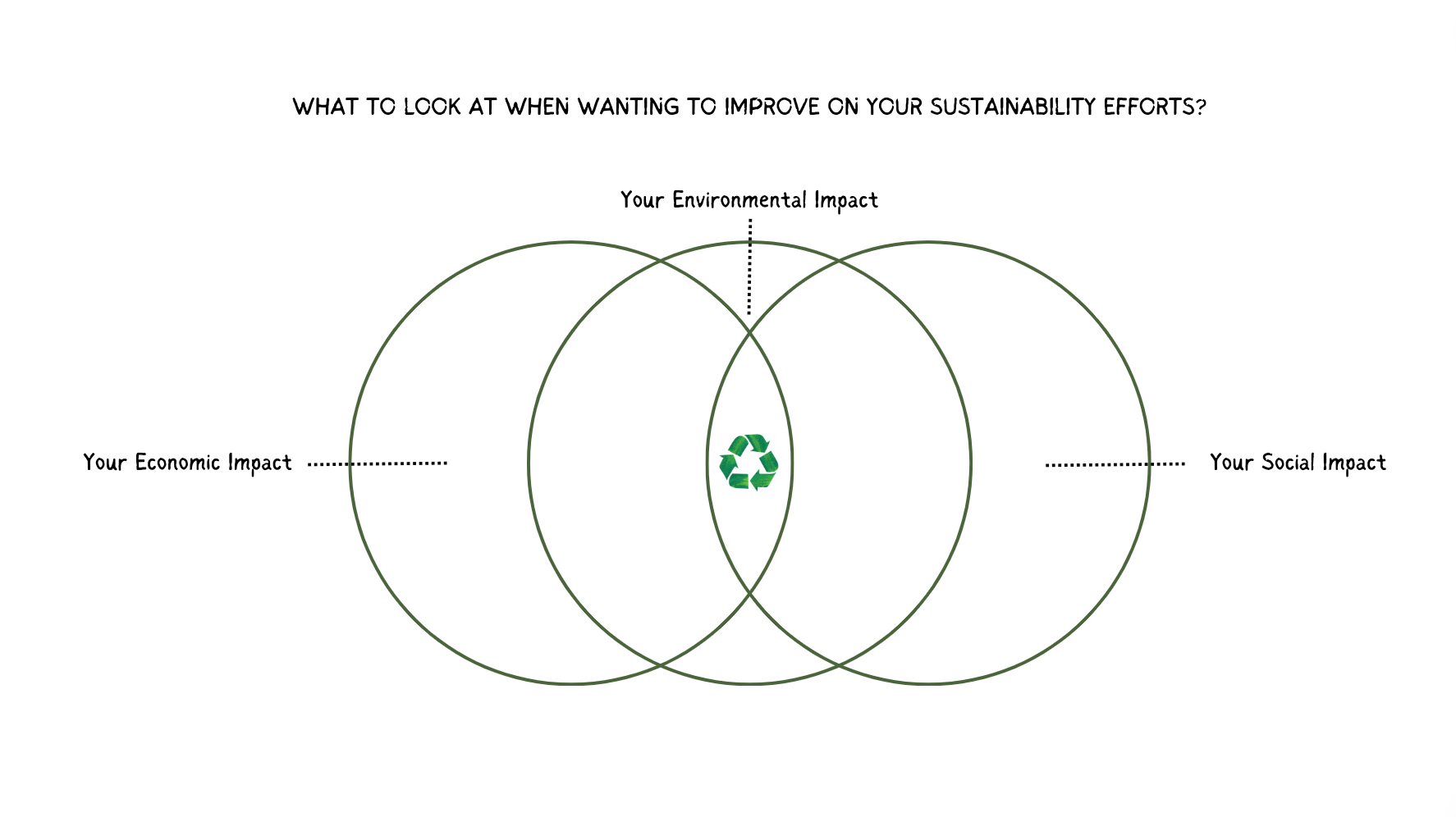
Your Building, Your Current Sustainability Efforts, Your Footprint.
Your team, Your Members, and Your Neighborhood looking for instance at diversity and inclusion or community impact.
Who do you work with, What impact do you generate on the local economy?
Case Study: Transforma Bxl’s Journey to Sustainability
Now that the basis of sustainability in coworking spaces has been introduced, it is time for us to deep dive into our coworking case study. Below the awaited summary of our conversation with Anis Bedda, Co-Founder of Transforma Bxl.
Since its inception, Transforma Bxl has redefined the intersection of sustainability, innovation, and community engagement and has evolved from a modest startup into an innovation playground.
At its core, Transforma Bxl champions eco-friendly practices and well-being, standing as a great example of sustainable entrepreneurship. Transforma Bxl's journey is marked by a commitment to environmental stewardship, community building, and the holistic health of its members. In our conversation with Anis, we discussed how, as a team and as a brand, they have seamlessly integrated sustainability into every facet of their operation, from zero-waste events to biodiversity projects and beyond.
Transforma Bxl Coworking "ID Card"
Location: Brussels, Belgium 🇧🇪
Q: How did Transforma Bxl come to life?
Anis: "Initially, I was introduced to community-based projects and coworking through Hub Brussels, which was part of the international network called The Hub before it transitioned into Impact Hub Brussels. Unfortunately, Hub Brussels closed down before the network's transformation into Impact Hub in 2012.
Together with a Hub member, we embarked on a project that led me to start Transforma as a prototype. We began with an abandoned tennis club and a starting budget of 3,000 Euros."
Anis Bedda, Co-Founder of Transforma Bxl
Number of spaces today: 2
Sneak Peek inside Transforma Bxl ⬇️
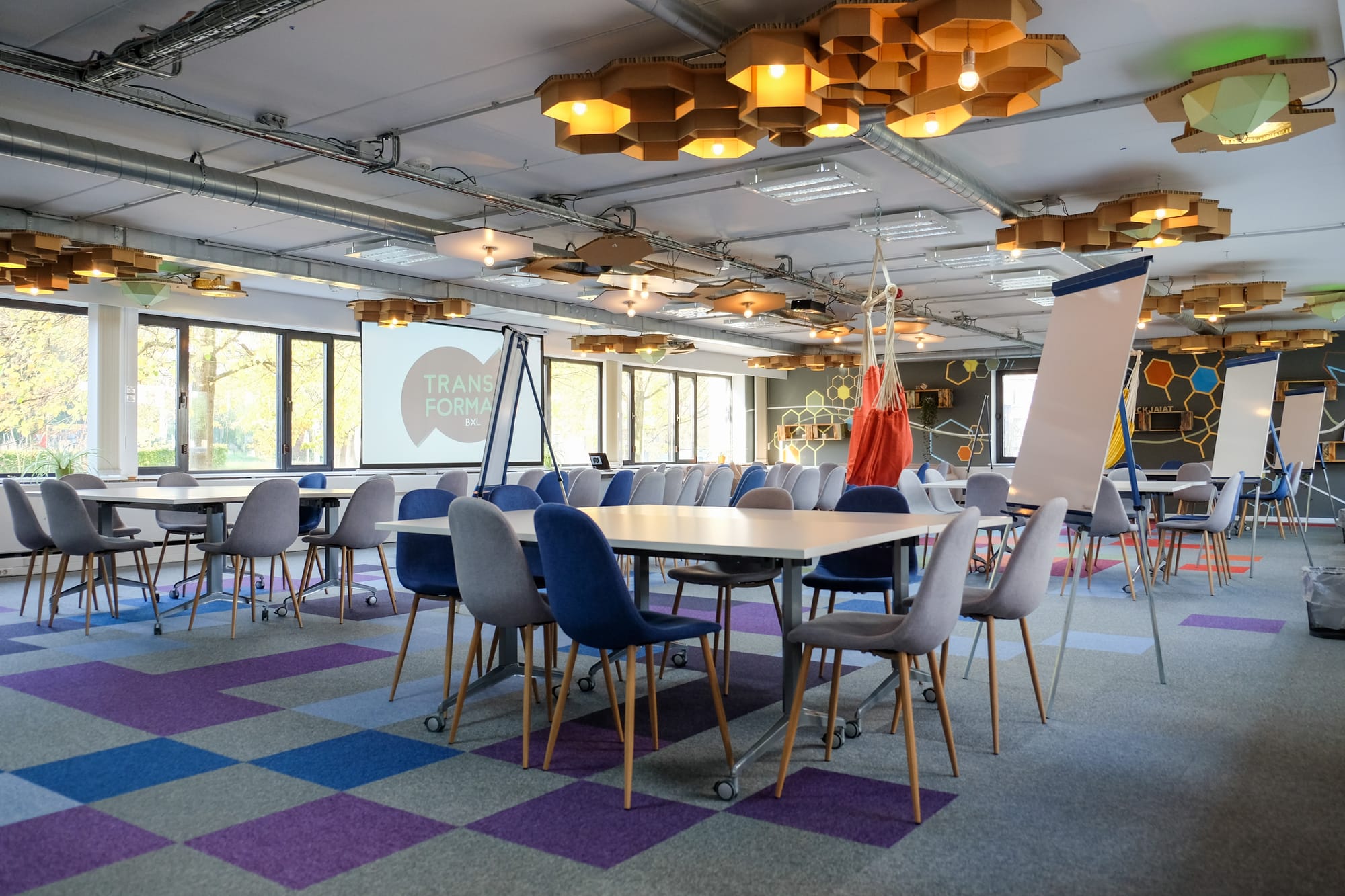
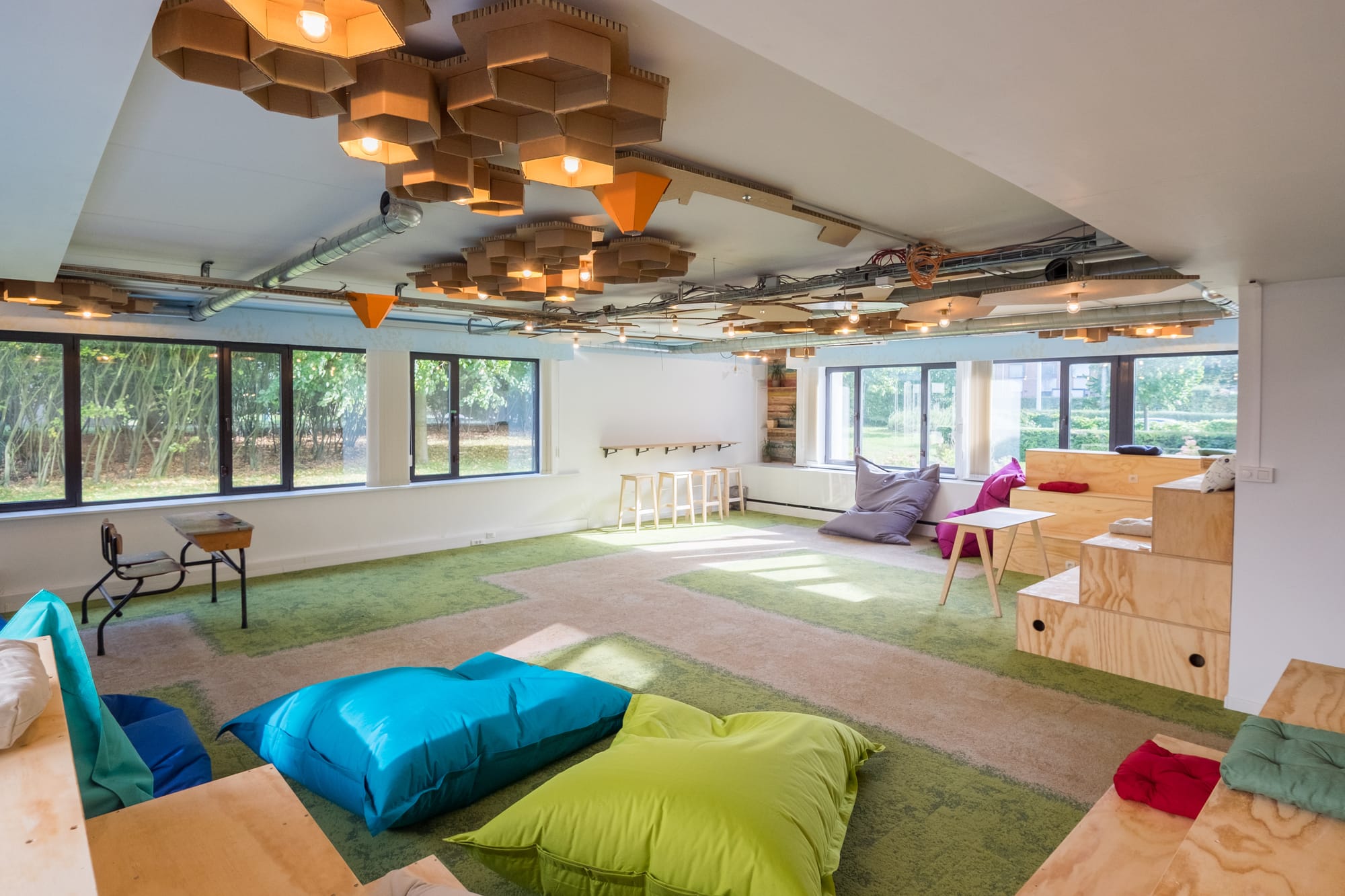
Images Credits: Transforma Bxl
Transforfma Bxl and Sustainability - A Coworking Case Study
📍 The Beginning
- Started with 3,000 euros and upcycled what they had to create the first iteration of Transforma Bxl in an abandoned Tennis Court.
😣 Facing Sustainable Challenges
- The biggest challenge Transforma Bxl has faced when it comes to sustainability? The building they are located in required a lot of investment to be brought to current sustainability standards.
🔎 Finding Sustainable Solutions
- Transforma Bxl did not rush into changing everything at once. Time has been their biggest asset as it has allowed them to surround themselves with the right people to help further their commitment to sustainability and build what they have today.
🌱 Transforma Bxl Today
- The space has been revamped on many levels to become more sustainable. Besides the interior, Transforma Bxl has also tapped into its local community to activate its outdoor spaces. The brand created an edible garden, beehives, and more initiatives detailed below that not only bring their community together but also create links with the neighborhood and the city.
A conversation with Anis Bedda, Co-Founder of Transforma Bxl
🎤 Hi Anis! So good to have you with us today. Could you start by introducing yourself: who are you and what do you do?
My name is Anis Bedda, and I am in my 40s, a father of three. I was introduced to coworking with Hub Brussels, a part of the Impact Hub Network, in 2009-2010. I started working with them as a consultant, creating events and managing their events portfolio, including meeting rooms and other responsibilities.
I was born and raised in Tunisia, where I completed my studies. Then, I began traveling and worked in Turkey, Spain, Toronto, and Canada. My journey led me to Belgium for what was supposed to be a short break, but it has now been 17 years.
During my career, I have worked in corporate settings and was involved with AIESEC as a student, an international organization of students exchanging people from different parts of the world to create cultural experiences and understanding between cultures. After practicing what I preached for six years as a member of AIESEC and growing tired of the corporate life, I ventured into working with a startup and eventually found my calling in creating project companies. One of my ventures is Transforma Bxl, which has expanded beyond Brussels to include a location in Flanders, making it simply "Transforma." I have also been involved in creating conferences and events worldwide on the topic of entrepreneurship, leading to the formation of a company initially named Intrapreneurship Conference, now called Innov8rs, focusing on implementing innovation culture in large corporations based on bottom-up principles.
Currently, my main interest lies in well-being and health, encompassing fitness, nutrition, sleep, meditation, and all aspects of health. I founded a digital project named Zendare, an app designed to coach people on understanding what constitutes a good life in terms of health and well-being and then adopting new healthy practices. My work now extends to implementing these concepts on a physical level at Transforma, creating a well-being program for our members and corporate clients. This program includes a fitness location at Transforma, both indoors and outdoors, with a functional training space that avoids machines in favor of body weight exercises, bars, barbells, and kettlebells. Outdoor activities include calisthenics and gymnastics. I am enthusiastic about this initiative.
As a fitness coach, I am currently training to achieve a higher level of coaching. We plan to work with fitness coaches, nutrition coaches, life coaches, breath coaches, and sleep coaches to significantly improve people's lives for the better.
🎤 How did you end up opening Transforma Bxl, your coworking space?
For those who are curious about how we did this, I've detailed the entire process in our blog [you'll find the links at the end of this article], spread across three parts. This includes how we bootstrapped Transforma from its inception, its development, and how it evolved into what we now call an innovation playground.
Initially, I was introduced to community-based projects and coworking through Hub Brussels, which was part of the international network called The Hub before it transitioned into Impact Hub Brussels. Unfortunately, Hub Brussels closed down before the network's transformation into Impact Hub in 2012. This experience taught me a lot, and I decided to apply what I learned in a new venture.
Together with a Hub member, we embarked on a project that led me to start Transforma as a prototype. We began with an abandoned tennis club and a starting budget of 3,000 Euros. With this modest sum, we upcycled everything we could find, refreshing the space with paint and making it more inviting. We utilized all available furniture, collected items, and even used plants from plant rental companies to kickstart Transforma. While working on various projects, we maintained a balance between the income generated and the need for a more permanent location, which we moved to in June 2015 after opening in March 2014.
Our growth was gradual. We built credibility within the community and with banks, enabling us to finance the project further. We adopted a bottom-up approach, starting with very low investment levels but gradually expanding. The entire building spans 3,000 square meters, of which we manage 2,600. We initially managed more space because we had created a Fab Lab in collaboration with the region. However, we no longer oversee the Fab Lab, which is now managed independently, though it remains part of the Transforma complex, offering our members access and close collaboration with the lab, even if we do not directly manage it.
🎤 How did your journey towards sustainability begin with Transforma?
We initiated our sustainability efforts before it became a widespread trend because we believed it was logically important to consider our environmental and economic footprint. For instance, upcycling furniture or creating our own from preferred materials like wood felt instinctive to us. Each new project, especially within the coworking space, is seen as an opportunity to control costs and reuse materials.
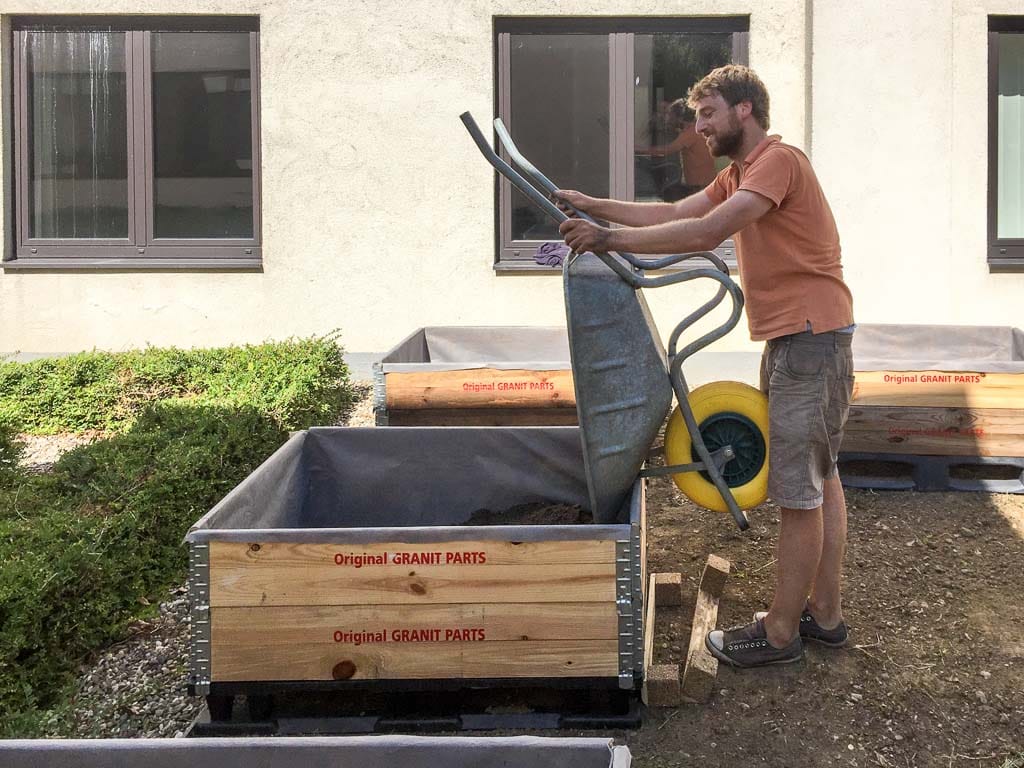
We're fortunate to have a large garden, where we've implemented numerous projects, such as a permaculture* project, which strengthens community bonds. This includes a pond, a composting system, and an edible forest. Additionally, with the help of new community members, we established a micro forest*, planting numerous trees closely together to encourage rapid growth. Our efforts have earned us a biodiversity certification and the Green Key certification* for hospitality locations, reflecting our commitment to stringent sustainability criteria.
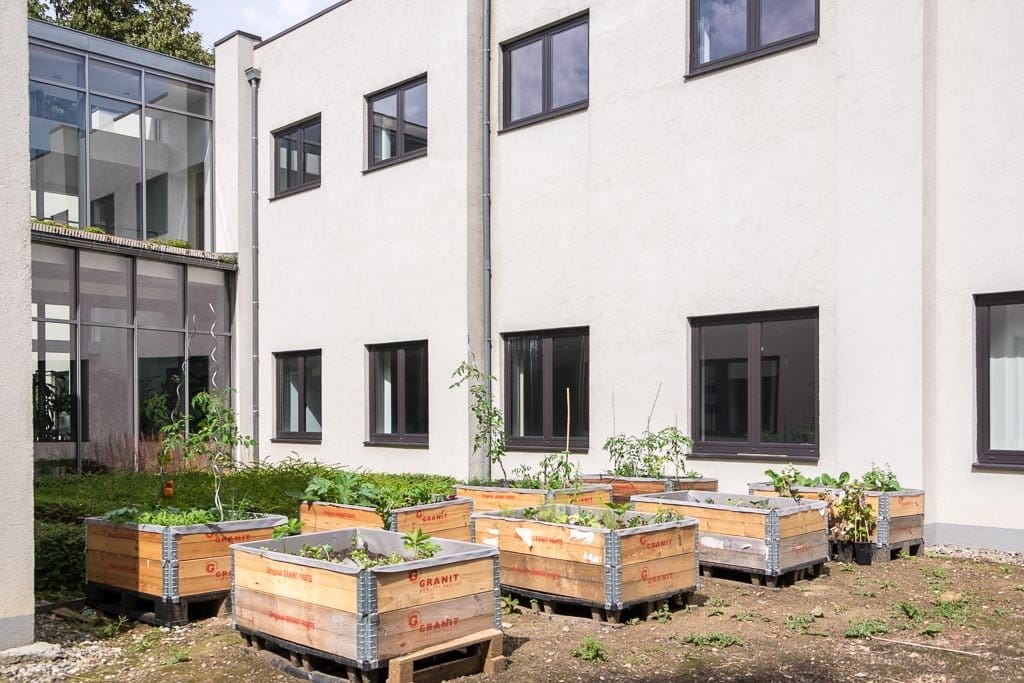
For our events, we've adopted a zero-waste approach, emphasizing the reuse of materials and avoiding plastic containers to enhance our guests' and clients' experience. This ethos extends to every aspect of our operations, aiming for an ecological impact through initiatives like water collection systems in the garden and maintaining over 500 indoor plants, from large to small, including maintaining beehives.
*Glossary of Terms Used by Anis:
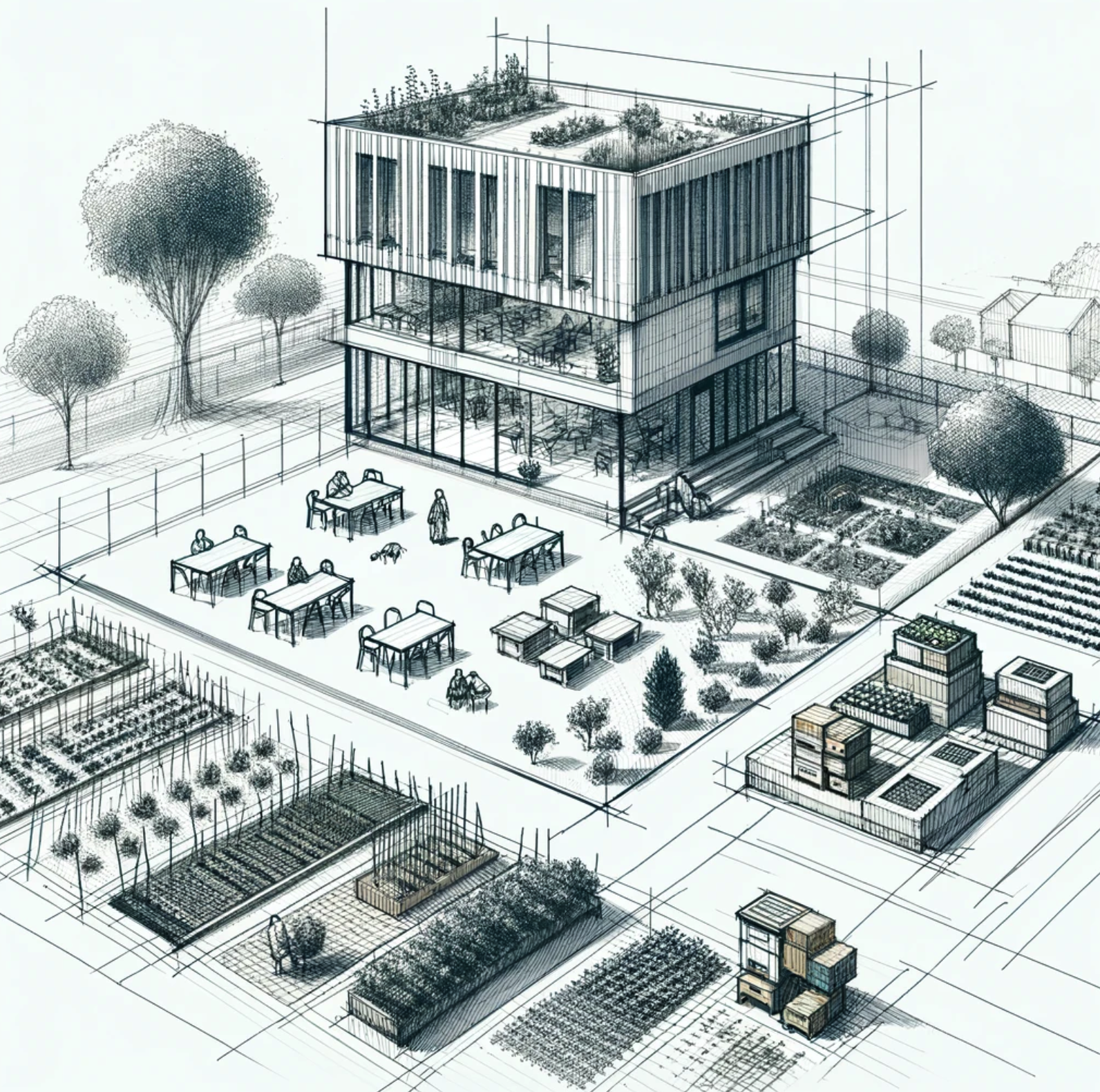
Permaculture is a holistic agricultural system that aims to create sustainable and self-sufficient ecosystems by mimicking natural processes. It emphasizes the interconnection of plants, animals, and the landscape to produce food, energy, shelter, and other needs sustainably.
A micro forest is a small, dense forest planted intentionally to mimic the natural ecosystem of a mature forest. It focuses on rapid growth and biodiversity, aiming to create a self-sustaining environment that benefits both urban and rural areas by enhancing biodiversity, storing carbon, and improving air quality.
Green Key Certification is an international eco-label awarded to accommodations and other hospitality facilities that commit to sustainable and environmentally friendly practices.
🎤 Could you detail the journey that led to the outcomes you're describing?
Honestly, it's very natural. There is no planning in terms of, 'Oh, we have to do it this way to be more sustainable.' Some things, yes, definitely, but many, or most of the things we did, were just logical.
For example, the water collection systems are very logical; we have a very big roof, and there's a lot of rain in Belgium, so it makes a lot of sense to collect that water to water the garden.
Then, in some projects, because I call all our sustainability efforts little projects, we initiated them because somebody in the community had access to that knowledge. For example, with the beehives, first, we started with members of the community who run a business called Beeodiversity. They install beehives in companies and government buildings. They initiated the project, then we worked with independent apiculture.
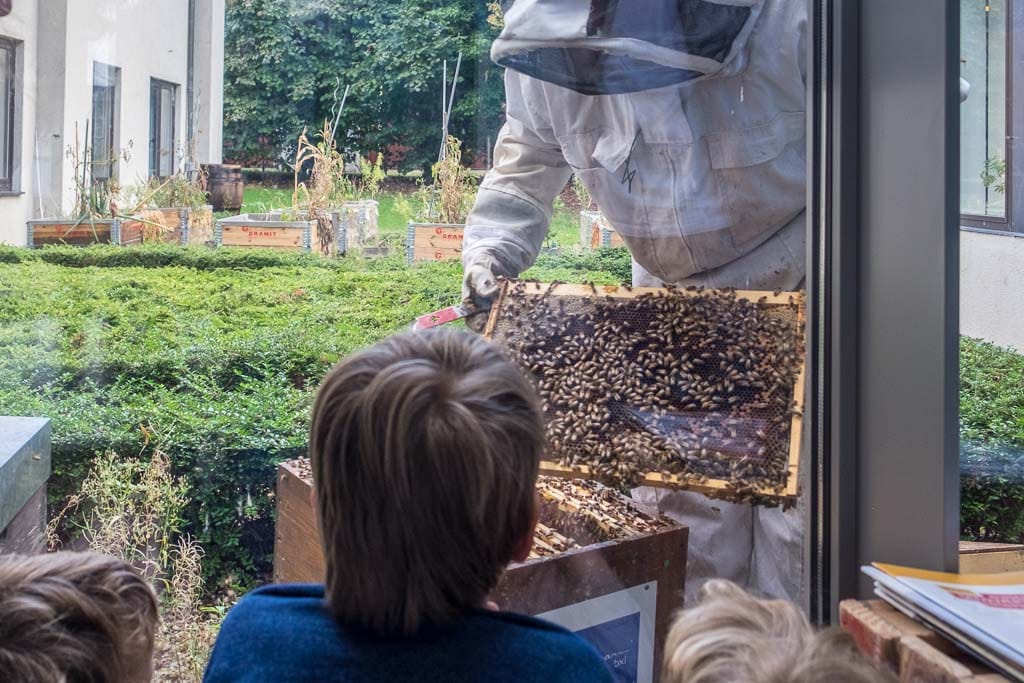
Project by project, we try to see what can be done, and what we can improve. Ideas come, they flow, and at the end of the day, they accumulate, and when I look around, I see a lot of those projects manifesting.
🎤 Do you have a person in charge of leading your sustainability efforts in the team?
It was always a team effort. A lot of the things came up just talking to members, to people, or seeing some other projects, or just naturally thinking about things.
A lot of suggestions came from the community, from service providers as well, like we had somebody who helps us fix things, and then he was like, 'Yeah, I can do the water collection system, but let's do it together'.
The only project that was managed from A to Z by one of our team members due to its complexity is the certification process to become a Green Key Hospitality Business. But other than that, we don't have somebody who's just focused on that; it's just natural and part of the DNA.
🎤 What would you say has been challenging for you guys in your sustainability journey?
The building has been challenging because we're located in an old building that required a lot of work to bring it to standards. That's the most challenging part, the facility management part. But here as well, we're blessed to have existed for nine years now, so the more we go forward in time, the more we add to these initiatives.
For example, this year, we made sure that most of the lights are controlled by automatic systems, so as not to have to push the light on and off. We're changing the remaining lights that are not in LED. That involves a lot of investment, so we do that slowly as well.
So if we keep improving and doing things, also from an economic perspective, it costs less money. It's an investment in the beginning, investing in LED bulbs, and different systems, sometimes we have to change the whole system, which costs money. So whenever we have money to invest, we can do that. It's an investment upfront, but then it costs us less money later on.
🎤 What would be your number one piece of advice to coworking operators wanting to start with or improve on their sustainability journey?
Make it part of your DNA. I see sustainability as a whole; it's not only about ecological footprint, it's the way we deal with things.
Sustainability means they last, so we need lasting people, we need lasting organizations, we need lasting ideas, even though ideas move and change and form and reform. But that's the point: how could we make that experience also an agreeable and nice experience?
For example, working on the garden and creating all these projects in the garden make it a great experience for our team, for our members, for the visitors. But I think we don't get enough credit for everything we do. We don't communicate too much about it because we try to do so many things at the same time.
We built what we call innovation programs at Transforma. A place where you can experience things and come and experience your ideas, whether you have a new business idea, you're a startup, or a small business, or even a corporate coming just for team building; you'll have a different experience anyway. But if you're a small business or an entrepreneur, our objective is to allow you to manage your activity from this place and have access to all the tools you need. This is why we develop all these side projects like a podcast studio, video studio, and a professional warehouse where you can have access to whatever products or material you need to store. So you can have your storage space next to your office, which is a big challenge.
We have many of these projects, and we struggle to communicate so much information and make it accessible to people. What is the angle of the communication we need to use? Is it a sustainability angle, or is it the everything under one roof angle, or is it the well-being angle? So there's so much going on that we have a multi-layered identity.
🎤 What would you say has been your biggest learning, in the entire process of reaching where you are today?
There's so much to talk about. I would say energy, in the sense of feeding energy, like the energy you need to develop these projects, think, and gather around you: so that the team's energy and inspiration.
If I'm talking about myself, I managed to learn how to harness that component, which we don't talk about a lot, it's always kind of left in the background. And I believe it's the most important part, especially in such a project that needs so much personal energy from the founders, from the team, because there's so much going on, and we don't have corporate backers, public backing, we don't have subsidies, so we need to think of the bottom line, deal with our problems, find our clients.
We suffer from big competition from subsidized spaces and publicly managed spaces as well, that propose lower prices, even though we don't offer the highest pricing in the sector, which means it's a difficult project to manage. So, that flowing level of energy was something I'm paying attention to, hence the well-being aspect of the program.
I think that was my biggest learning, how to make people follow you in some ideas, and inspire them to also be part of the project, and not only be my project or my co-founder's project but everybody's project, whether it's the team's project with the community project, and so on.
There was a balance to be found as well, between the economic part, it's a business, it's not an NGO, it's not funded, but at the same time, we have those values in our DNA that we don't want to lose.
So, the challenge is how to make melting pot a tasty soup, that is good for your health, but at the same time, that you appreciate, and you go like, this is nice, I want to eat my sustainability recipe, indeed.
It is the learning process, it's learning how to cook and appreciate that it can and will get messy to get tasty.
To Go Further
There is no better way to wrap up this coworking case study on sustainability than sharing additional resources that will allow you to explore further how different coworking spaces from around the world are building their sustainability effort and talking about it.
In reference to Anis' interview, explore below the early days of Transforma Bxl's and learn how they built what they have today while bootstrapping.
- How We Bootstrapped Our Coworking Space Part 1
- How We Boostrapped Our Coworking Space Part 2
- How We Boostrapped Our Coworking Space Part 3
You can also see below additional great resources to explore to help you structure your sustainability efforts:
Happening on Thursday, February 29th
Join this upcoming LIVE event and learn from coworking operators the most effective ways they found to sell their coworking space in 2024.
⚠️ Make sure to book your ticket by clicking on the button below to receive the streaming link we will use to go live.
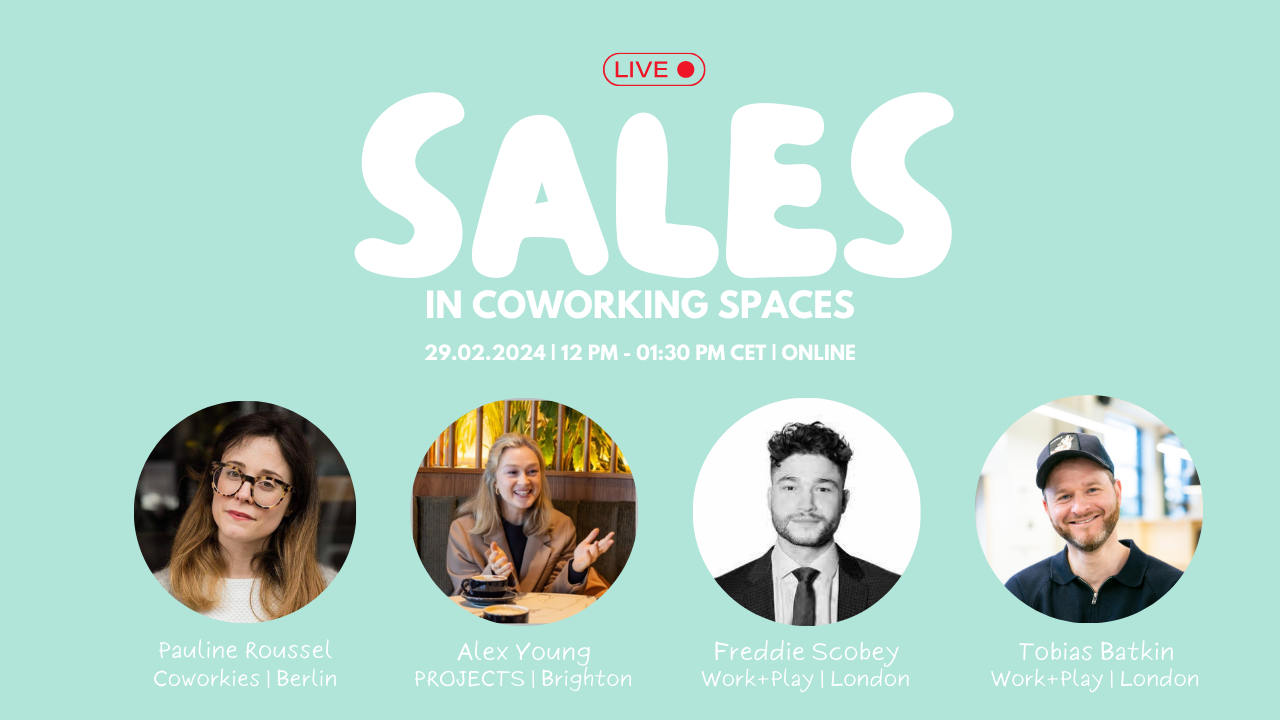
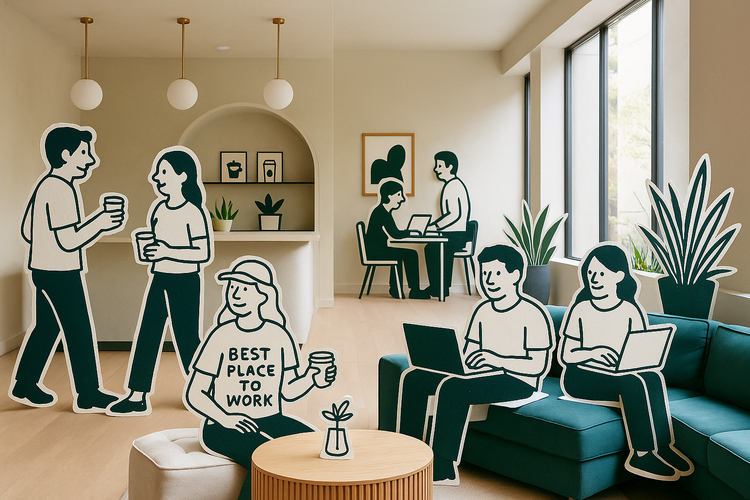
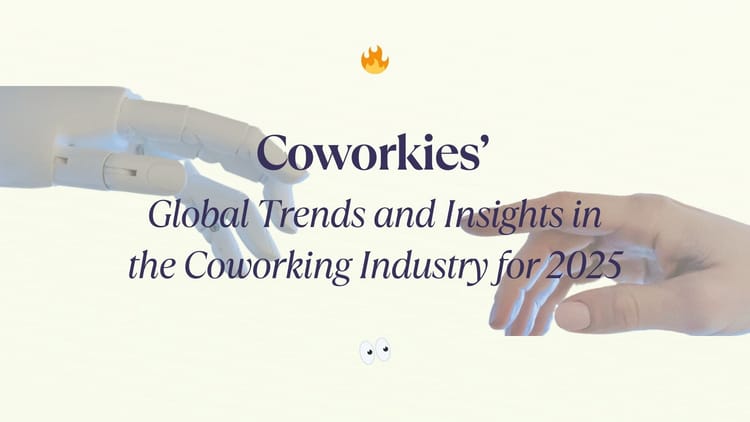
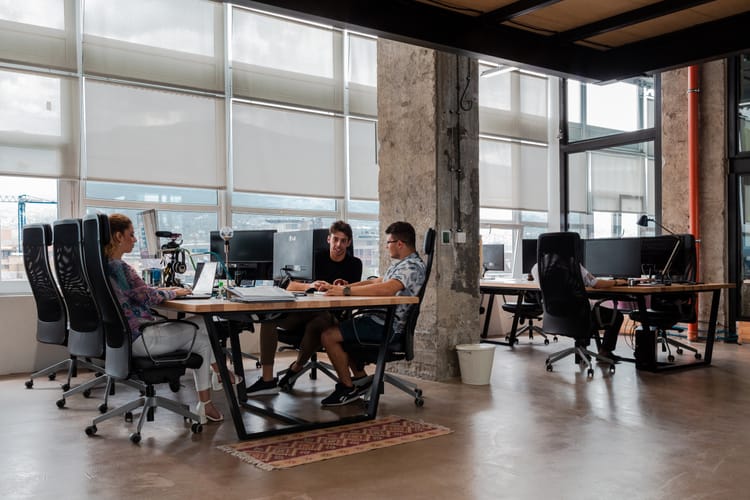
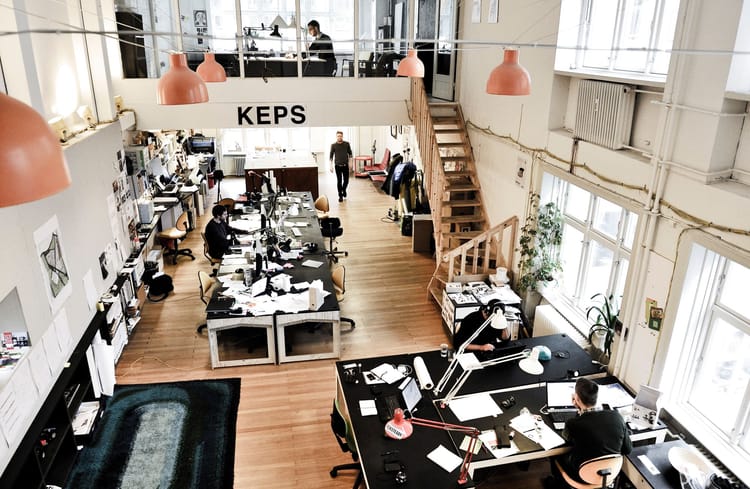
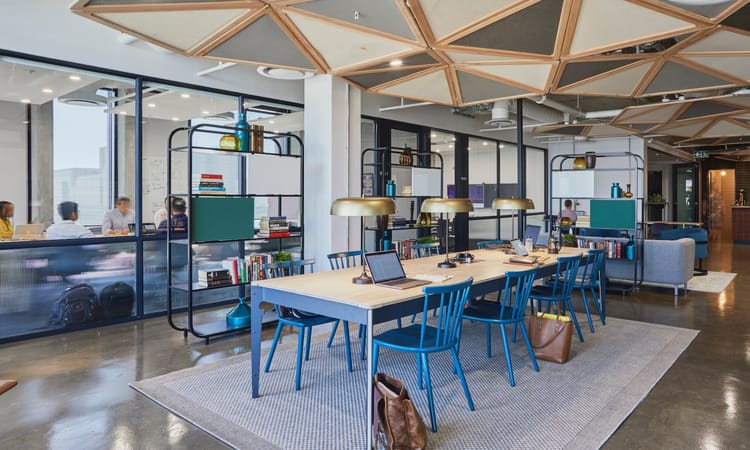
Member discussion